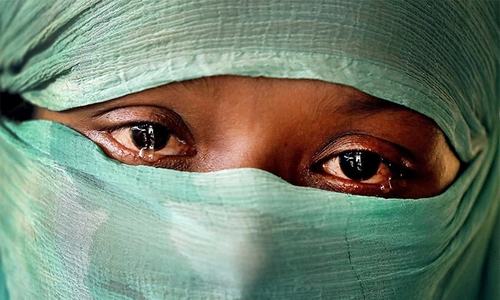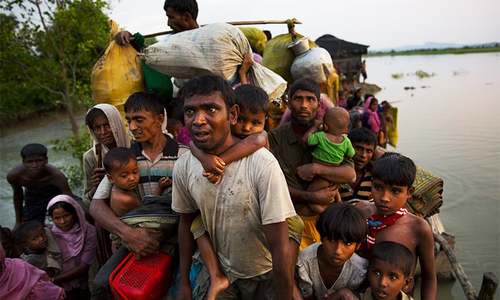The Myanmar military systematically prepared for attacks on Rohingya Muslims, confiscating knives and other sharp-edged tools, arming and training non-Muslim civilians and forcing Rohingya families to remove protective fences around their homes, the independent group Fortify Rights said Thursday.
The report by the Southeast Asian human rights group documented the preparations authorities made for a crackdown on the minority group living mostly in the country's western Rakhine state before a radical Rohingya group attacked Myanmar security force posts in late August 2017.
That attack was followed by what the United Nations and United States officials say was an ethnic cleansing campaign by the Myanmar government that led about 700,000 Rohingya to flee to Bangladesh amid harrowing violence.
The report, based on extensive interviews, said the Myanmar army began confiscating knives and other items that could be used as weapons or for self-defence after a group of Rohingya attacked police outposts in October 2016.
That prompted army-led attacks on dozens of villages that forced more than 94,000 people from their homes.
Authorities also seized chickens and other food from the Rohingya, it said.
The army also tore down or forced villagers to tear down fencing around their homes. It also trained and provided weapons to non-Rohingya living in Rakhine, suspended aid supplies and access by humanitarian groups to impoverished Rohingya communities, the report says.
“Taken together, these measures demonstrate a level of preparation not previously documented with respect to the Myanmar army-led 'clearance operations',” it said.
Fortify Rights said the finding were based on 254 interviews of eyewitnesses and survivors, Bangladesh and Myanmar military and police officials, members of the radical Arakan Rohingya Salvation Army (ARSA), analysts, doctors and aid workers.
The report said the civilians who attacked Rohingya were not vigilantes but were trained by the army and given swords and guns.
“There are reasonable grounds to believe that the crimes perpetrated in all three townships of northern Rakhine state constitute genocide and crimes against humanity,” it said, urging that those who perpetrated the violence be investigated.
The report says top military and police officials should be held responsible.
It also holds ARSA members culpable for killing at least six people thought to be government informants and for interfering with fleeing civilians, some of whom were threatened with death if they failed to support the radicals.
The Myanmar military did not immediately comment on the report. It has denied committing atrocities and blames the violence on Rohingya insurgents.
The Rohingya face official and social discrimination in predominantly Buddhist Myanmar, which denies most of them citizenship and basic rights. They are considered immigrants from Bangladesh, even though many settled in Myanmar generations ago.
Dire conditions led more than 200,000 to flee the country between 2012 and 2015, before the latest violence flared.
















































Dear visitor, the comments section is undergoing an overhaul and will return soon.